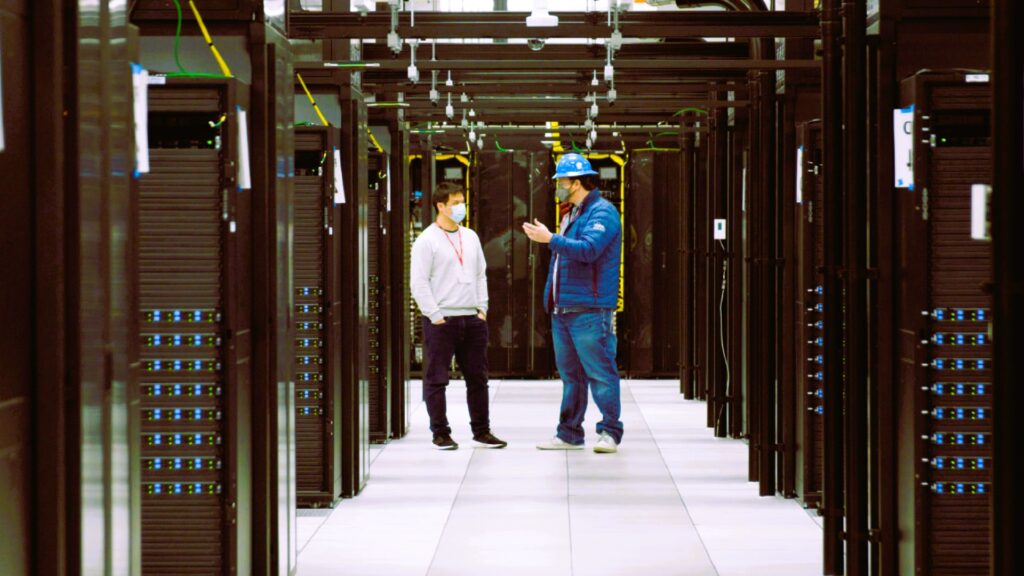In a groundbreaking move that underscores the relentless pursuit of innovation, Meta, the tech giant formerly known as Facebook, has unveiled its latest creation – a supercomputer powered by artificial intelligence (AI). Meta envisions this supercomputer to transcend existing benchmarks, emerging as the fastest of its kind globally. As the tech landscape embraces the convergence of AI and supercomputing, this development marks a significant leap forward, promising to reshape the landscape of data processing and artificial intelligence.
The Birth of Meta’s AI Supercomputer:
Meta’s foray into the realm of supercomputing is not merely an incremental step but a leap into uncharted territory. The company, known for its ventures in social media, virtual reality, and augmented reality, is now venturing into the domain of high-performance computing, aiming to redefine the limits of what AI-powered machines can achieve.
1. Unprecedented Computational Power:
Meta’s AI supercomputer is touted to boast unprecedented computational power, capable of processing an astronomical number of calculations per second. The design and architecture of the supercomputer reflect Meta’s commitment to pushing the boundaries of what is technologically achievable.
2. AI Integration:
What sets Meta’s supercomputer apart is its symbiotic integration with artificial intelligence. The machine is not merely a powerhouse of raw computational abilities but a sophisticated AI-driven system designed to handle complex tasks, from natural language processing to advanced machine learning algorithms.
The Quest for Speed:

The quest to create the world’s fastest AI supercomputer aligns with Meta’s vision of advancing technologies that underpin the metaverse, a concept that envisions a shared virtual space that intersects physical and digital realities. Speed, in this context, is not just about raw processing power but about creating an environment where AI interactions seamlessly mirror real-world experiences.
1. Real-Time Applications:
Meta envisions real-time applications for its AI supercomputer that transcend traditional computing boundaries. From immersive virtual reality experiences to instantaneous language translation, the speed of the supercomputer aims to erase the lag between human intent and machine response. You can read more about the expectation of revolutionary innovations for users in the article about the Microsoft Quantum Leap.
2. Metaverse Evolution:
The metaverse, a concept that has gained traction across the tech industry, requires a technological infrastructure capable of supporting vast virtual spaces populated by interactive and responsive elements. Meta’s AI supercomputer is positioned as a key component in the evolution of the metaverse, enabling new levels of realism and interactivity.
Challenges and Ethical Considerations:
As Meta propels itself into the forefront of AI supercomputing, the journey is not without challenges and ethical considerations. The sheer scale and capabilities of such a system raise questions about data privacy, security, and the ethical implications of AI applications.
1. Data Privacy:
The processing capabilities of Meta’s supercomputer necessitate access to vast amounts of data. Ensuring robust data privacy measures becomes paramount to prevent misuse and safeguard user information.
2. Ethical AI Use:
With great computational power comes the responsibility of ethical AI use. Meta must navigate the ethical considerations of AI applications, ensuring that the technology is wielded responsibly and aligns with societal values.
Industry Implications and Collaboration:
The unveiling of Meta’s AI supercomputer has broader implications for the tech industry. The convergence of social media, virtual reality, and high-performance computing hints at a future where seamless digital experiences are not just a possibility but an imminent reality.
1. Collaboration in AI Research:
Meta’s venture into AI supercomputing invites collaboration with the broader scientific and technological community. Collaborative efforts in AI research can accelerate advancements and address challenges more effectively.
2. Competitive Landscape:
The creation of the world’s fastest AI supercomputer positions Meta competitively in the global tech landscape. The company’s ability to harness this technology for practical applications will likely influence the competitive dynamics in various industries.
Platforms for Staying Informed:

Stay abreast of the latest developments in AI, supercomputing, and Meta’s endeavors through platforms like GameSpot. While these platforms are recognized for their gaming and entertainment coverage, they often feature in-depth articles and discussions on cutting-edge technologies, making them valuable resources for staying informed.
Conclusion: Shaping the Future with Meta’s AI Supercomputer
Meta’s bold venture into creating the world’s fastest AI supercomputer signals a transformative chapter in the evolution of technology. Beyond the raw computational power, the integration of artificial intelligence positions this supercomputer as a catalyst for redefining how we interact with digital realms. As the tech community watches with anticipation, Meta’s foray into supercomputing promises to shape the future of AI applications, influence the development of the metaverse, and propel the boundaries of what is technologically achievable. However, with great power comes great responsibility, and Meta’s journey will inevitably involve navigating the ethical considerations that accompany such groundbreaking advancements. The unveiling of this AI supercomputer is not just a technological milestone; it’s a glimpse into the accelerated pace of innovation that defines the digital age.


